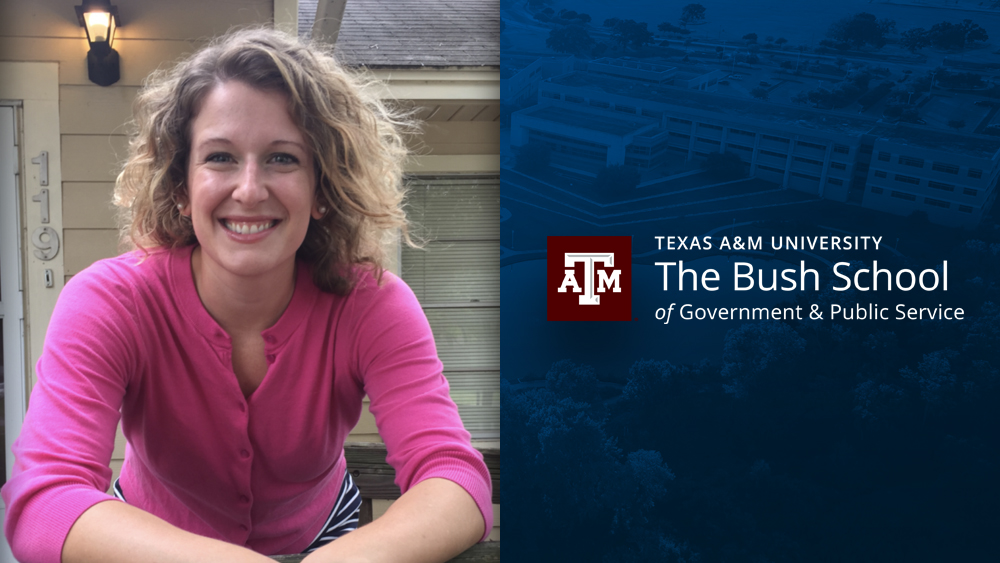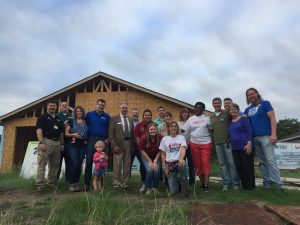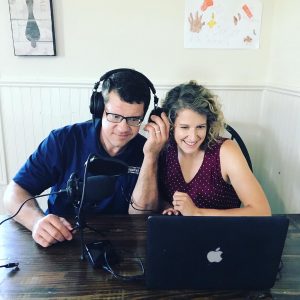
Former Student Whitney Coats ‘08, ‘10 (MIA) embodies the Aggie core value of selfless service.
By Mia Mercer ‘23
For former student Whitney Coats ‘08, ‘10 (MIA), selfless service is more than an Aggie core value; it’s her career.
Since August 2015, Coats and her husband, Charles Coats have worked for Bryan-College Station Habitat for Humanity (BCS Habitat), an affiliate of the global, nonprofit housing organization, Habitat for Humanity, that seeks to provide homes for low-income families in the BCS community. Coats works as a technology specialist for the organization’s website to promote their mission, expand their reach, and advocate for change within the BCS community.
“You don’t really understand what’s going on in your community until you get involved and meet people that you wouldn’t necessarily meet if you weren’t doing some sort of service project,” Coats said. “When it comes to creating communities that are a good place to live, we can come together to understand each other and that can probably impact a lot of local decisions. If you understand where people are coming from, it’s probably going to make for better policies in the long term.”

Although Coats always envisioned herself in a service oriented career, working for BCS Habitat wasn’t a part of her original professional blueprint.
“I was a sophomore in high school when 9/11 happened, so I had a sudden interest in national security, specifically in intelligence,” Coats shared. “When I was 12, I attended the Bush School’s grand opening, and decided that’s where I wanted to go to grad school. So I ended up going to A&M and studying political science because I knew I wanted to go to the Bush School and study national security for a master’s.”
In 2010, Coats fulfilled her childhood dream and graduated from the Bush School with a master’s in international affairs. But because of a hiring freeze and the 2008 financial crisis, neither Coats nor her husband were able to immediately get jobs. After staying in town a few years, Coats and her husband decided to join the Peace Corps in order to get the international experience they both wanted.
“Being in the Peace Corps kind of reoriented us,” Coats said. “That’s when we first learned public service doesn’t have to be national security. It can be other stuff too, like working in your own local community.”
A few months into their service with the Peace Corps, Coats and her husband became pregnant with their first child and were excused from their service so they could go home and have their baby. In need of a new job, Coats and her husband applied for BCS Habitat.
“Habitat does zero interest loans to low-income families. Some people think we give away the homes, but we don’t,” Coats explained. “Families in town who are having trouble affording a good home but can’t get a mortgage from the bank can apply for a home and we will work with them to find a piece of land they can buy and we can work on it. And they actually work on their home too, it’s not just us.”
While soon-to-be homeowners work on their new homes, BCS Habitat also offers classes where they can learn about proper home maintenance to help reduce all the future costs of owning a home. They also provide financial counseling to make sure they know what a mortgage is, and how they can best pay it off.

“A lot of our homeowners do pay off their mortgages quickly, which is great because it helps when they get older if they may not have a job or if they want to pass it off to their kids; that’s just a wonderful thing to be able to do,” Coats shared. “What I do for habitat started off as just editing the website. Now, I help with IT problems, marketing, and communications. I’ve written a lot of the stories that you’ll see on the websites for families, communication, and fundraising, and the last thing I’ve started with my husband is a podcast.”
After being encouraged to get involved in more advocacy, Coats and her husband created Think Brazos, a podcast that advocates for the families BCS Habitat can’t help.
“We recognize that we have limited capacity to help by building eight to 12 homes a year,” Coats explained. “We can’t help everybody so my husband and I started doing research a few years ago answering questions like ‘how can we help more people?’ ‘How can we help more homes get built?’ ‘What are other cities doing?’ ‘Why is housing getting more expensive for everybody everywhere?’ We started learning everything we could about housing supply and economics and housing and urban economics, topics I never thought I’d be learning about. So basically we came up with the idea of ‘Well, since we’re already going to be having these discussions about policy with city councils with policy experts, why don’t we start recording it and sharing it with anybody else who wants to learn?’ So that’s what the podcast is about. As we’re learning about these issues, everybody else can learn too.”
Coats said she enjoys meeting the families, learning about the struggles they’ve been through, and how much credit they give to God. For anyone interested in volunteering with BCS Habitat, visit their website and sign up to build houses with the families.
“I used to think that I had to have a certain job in D.C.: one of those really cool-sounding jobs in national security,” Coats shared. “Growing up I wanted to go to other places and see other things, which is why I studied what I did, but I’ve learned how to really enjoy the life that I have here in my own community. Being content with the life you have and enjoying it is something not a lot of people can do. It’s wonderful to be able to recognize that even if your life didn’t turn out the way that you wanted, it’s still great.”
On Sept. 1, 2022, the Department of Political Science became part of the Bush School of Government & Public Service.